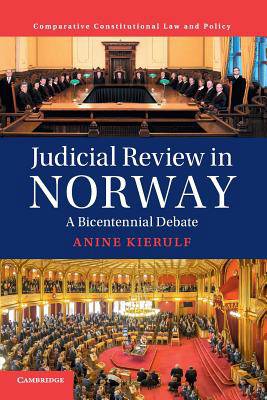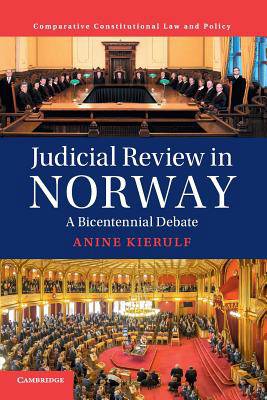
Door een staking bij bpost kan je online bestelling op dit moment iets langer onderweg zijn dan voorzien. Dringend iets nodig? Onze winkels ontvangen jou met open armen!
- Afhalen na 1 uur in een winkel met voorraad
- Gratis thuislevering in België vanaf € 30
- Ruim aanbod met 7 miljoen producten
Door een staking bij bpost kan je online bestelling op dit moment iets langer onderweg zijn dan voorzien. Dringend iets nodig? Onze winkels ontvangen jou met open armen!
- Afhalen na 1 uur in een winkel met voorraad
- Gratis thuislevering in België vanaf € 30
- Ruim aanbod met 7 miljoen producten
Zoeken
Omschrijving
Outside the United States, Norway's 1814 constitution is the oldest still in force. Constitutional judicial review has been a part of Norwegian court decision-making for most of these 200 years. Since the 1990s, Norway has also exercised review under the European Convention of Human Rights (ECHR). Judicial review of legislation can be controversial: having unelected judges overruling popularly elected majorities seems undemocratic. Yet Norway remains one of the most democratic countries in the world. How does Norway manage the balance between democracy and judicial oversight? Author Anine Kierulf tells the story of Norwegian constitutionalism from 1814 until today through the lens of judicial review debates and cases. This study adds important insights into the social and political justifications for an active judicial review component in a constitutional democracy. Anine Kierulf argues that the Norwegian model of judicial review provides a useful perspective on the dichotomy of American and European constitutionalism.
Specificaties
Betrokkenen
- Auteur(s):
- Uitgeverij:
Inhoud
- Aantal bladzijden:
- 342
- Taal:
- Engels
- Reeks:
Eigenschappen
- Productcode (EAN):
- 9781108445429
- Verschijningsdatum:
- 8/08/2019
- Uitvoering:
- Paperback
- Formaat:
- Trade paperback (VS)
- Afmetingen:
- 152 mm x 229 mm
- Gewicht:
- 435 g

Alleen bij Standaard Boekhandel
+ 121 punten op je klantenkaart van Standaard Boekhandel
Beoordelingen
We publiceren alleen reviews die voldoen aan de voorwaarden voor reviews. Bekijk onze voorwaarden voor reviews.











